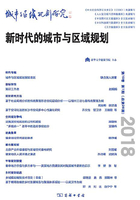
上QQ阅读APP看书,第一时间看更新
知识工作者1
赵娟娟
Knowledge Workers
ZHAO Juanjuan
(School of Architecture, Technical University of Munich, Munich 80333, Germany)
Abstract Knowledge workers, as individual agents who embody, transmit, exchange, create and exploit knowledge, function as “innovation engines” for knowledge-intensive firms, thus advancing the development of metropolitan regions. To better attract and retain knowledge workers, it is necessary to have a good understanding of their spatial preference and choice mechanism. This article has reviewed the existing research on the spatial preference of knowledge workers, specifically the spatial preference for residence and workplace. In addition, this article emphasizes the heterogeneity of their spatial preference from the perspective of knowledge type (analytical-synthetic-symbolic knowledge). In the end, this article proposes several policy implications and directions for further researches.
Keywords knowledge workers; spatial preference; residence location; workplace location
摘 要 知识工作者作为携带、传递、交流、创造及利用知识的个体单元,是知识密集型企业的创新“引擎”,能够促进大都市区的发展。为更好地吸引和保留这些知识工作者,对其区位偏好和决策机制的探究必不可少。文章简要回顾了已有关于知识工作者职住区位偏好的研究,其中特别强调了从知识类型(分析型、综合型、符号型)这一新视角下研究职住区位偏好及选择的差异性,最后提出了本研究的政策启示及未来深入研究的方向。
关键词 知识工作者;区位偏好;居住地点;工作地点
知识经济在全球化背景下越来越凸显其重要性(Archibugi and Lundvall,2001;Currid and Connolly,2008),知识作为核心竞争力是人类经济社会发展史上继农业和工业革命之后的第三次重要变革。知识经济时代下,运用已有知识创造或改进商品及服务的能力大小很大程度上决定了财富积累的多少(Savage,1996)。